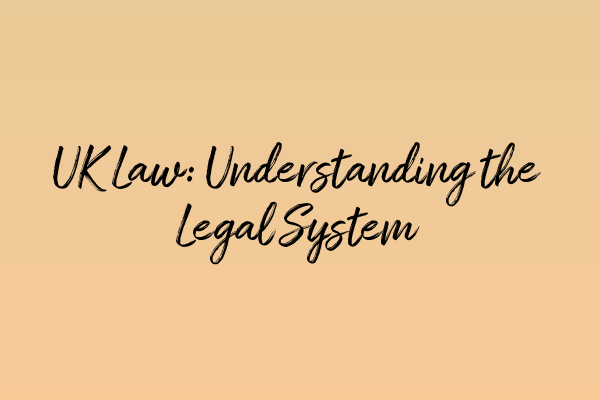UK Law: Understanding the Legal System
Welcome to our comprehensive guide to understanding the legal system in the United Kingdom. Whether you are an aspiring solicitor, a law student, or just a curious individual, this blog post aims to provide you with a clear and concise overview of the UK legal system. We will unravel the intricacies of this complex framework, making it easier for you to navigate the world of law.
Before we delve deeper, let’s take a moment to understand the importance of legal knowledge in our society. The law acts as a foundation for maintaining order, upholding justice, and safeguarding the rights of individuals and businesses. A deep understanding of the legal system is crucial for anyone seeking justice, pursuing a legal career, or even for everyday situations where you might need legal advice.
Now, let’s explore the UK legal system in detail.
1. The Constitution:
The UK does not have a single, written constitution. Instead, its constitution is formed by a combination of laws, conventions, and legal principles. Key elements of the constitution include legislative sovereignty, the rule of law, and the separation of powers.
Keywords: UK legal system, constitution, legislative sovereignty, rule of law, separation of powers
2. Courts and Tribunals:
The court system in the UK is comprised of a hierarchical structure. At the apex is the Supreme Court, followed by the Court of Appeal, High Court, and County Courts. These courts are responsible for interpreting and applying the law in various cases. Additionally, specialized tribunals exist to handle specific areas of law such as employment, immigration, and tax.
Keywords: UK courts, Supreme Court, Court of Appeal, High Court, County Courts, tribunals
3. Legal Professions:
The UK legal system consists of various legal professions. Solicitors are lawyers who provide legal advice, handle legal documents, and represent clients. Barristers, on the other hand, specialize in advocacy and represent clients in higher courts. Chartered Legal Executives have similar rights of audience as solicitors, while paralegals provide support to legal professionals.
Keywords: legal professions, solicitors, barristers, chartered legal executives, paralegals
4. Sources of Law:
UK law derives its authority from various sources. Primary sources include statutes (laws passed by Parliament), statutory instruments, and common law (laws created through court judgments). Additionally, EU law played a significant role until the UK’s departure from the European Union in 2020. International treaties and conventions also influence UK law.
Keywords: sources of law, statutes, statutory instruments, common law, EU law, international treaties
5. Criminal and Civil Law:
The UK legal system is divided into criminal and civil law. Criminal law deals with offenses against society and is prosecuted by the state. Civil law addresses disputes between individuals or organizations and aims to compensate the harmed party. Understanding the differences between these two branches is essential to navigating the legal system.
Keywords: criminal law, civil law, offenses, disputes, prosecution, compensation
6. Legal Aid and Access to Justice:
Access to justice is a fundamental aspect of the UK legal system. Legal aid is available to individuals who cannot afford legal representation. It ensures that everyone, regardless of their financial status, has equal access to justice. Understanding the availability and eligibility for legal aid is crucial for those seeking legal assistance.
Keywords: legal aid, access to justice, legal representation, financial status, eligibility
7. Legal Precedent:
One unique aspect of the UK legal system is the doctrine of binding precedent. This means that lower courts are bound to follow decisions made by higher courts. Precedent forms a strong foundation for legal reasoning and consistency within the system. Understanding how precedent works is essential for legal professionals and individuals involved in legal disputes.
Keywords: legal precedent, binding precedent, higher courts, legal reasoning, consistency
In conclusion, understanding the UK legal system is integral to anyone dealing with legal matters. Whether you aspire to be a solicitor, barrister, or simply want to arm yourself with legal knowledge, taking the time to grasp the intricacies of this complex system will undoubtedly be beneficial. Remember, if you require legal advice or representation, consulting a qualified solicitor is always recommended.
Do you have any questions or need further information about the UK legal system? Feel free to reach out to us at [email protected], and our team of experienced solicitors will be happy to assist you.
Keywords: UK legal system, legal knowledge, aspiring solicitor, law student, legal advice
[End of Blog Post]


Leave a Reply